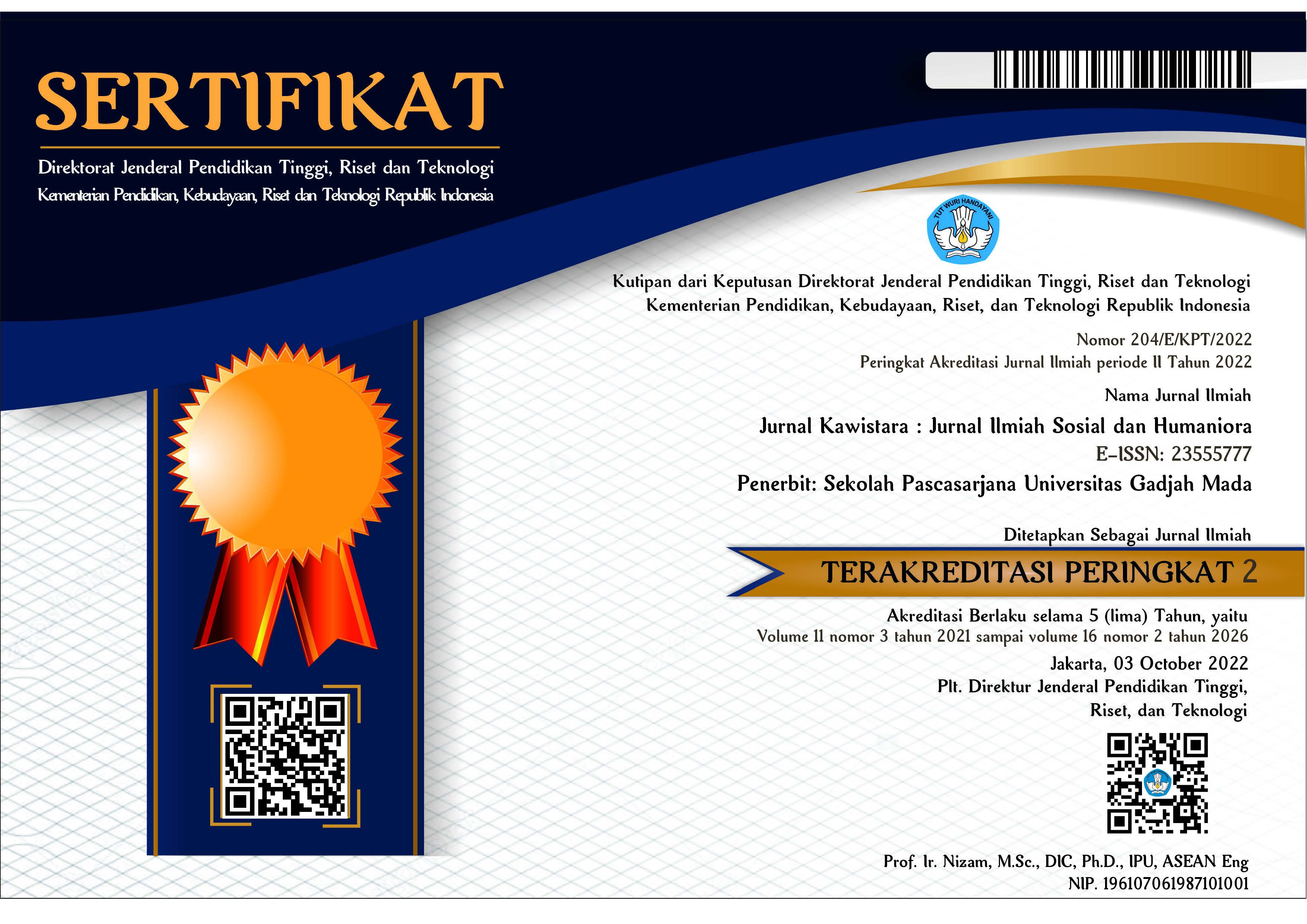MEMPERBESAR TENTARA CADANGAN PEKERJA: “BONUS DEMOGRAFI” DAN EKONOMI POLITIK NEGARA NEOLIBERAL DI INDONESIA
Arif Novianto(1*)
(1) Institute of Governance and Public Affairs (IGPA), Magister Administrasi Publik (MAP) - Universitas Gadjah Mada (UGM)
(*) Corresponding Author
Abstract
Demographic dividend which means that the amount of productive age (ages 15-65 years) has been interpreted by liberals as an opportunity for great improvement in the economy of a country. In a report from the World Bank, ILO and Bappenas said that the demographic dividend that occurred in Indonesia and reached its peak in 2035 is a golden bridge towards progress. This means that Indonesia if it is able to use it believed to be a country with high income and can transform into an industrial country. This paper seeks to elaborate on the structural condition of the emergence of the demographic dividend and associate it with the ASEAN Economic Community (AEC) which was implemented in 2015. Through analysis of the political economy of this paper will discuss about the problems faced by the reserve army of labour in relation to the neoliberal state. The findings of this paper is: 1) the impasse in the agrarian transformation process; 2) the demographic dividend entangled in the framework of the neoliberal state; 3) the reserve army of labour into specific mechanisms of capitalism in controlling wages and depoliticize the labor movement.
Keywords
Full Text:
PDFReferences
Antara News, 2016. President Jokowi Calls for Establishment of Millions of Vocational Schools. Available at: http://www.antaranews.com/en/news/108240/president-jokowi-calls-for-establishment-of-millions-of-vocational-schools.
ASEAN, 2012. ASEAN Selayang Pandang 20th ed., Jakarta: Sekretariat Direktorat Jenderal Kerjasama ASEAN.
Badan Pusat Statistik Indonesia, 2013. Proyeksi Penduduk Indonesia Indonesia Population Projection 2010-2035. Jakarta: BPS.
Basu, D., 2012. The Reserve Army of Labour in the Postwar U . S . Economy : Some Stock and Flow Estimates. Working Papers.
Bauman, Z., 2014. Wasted Lives: Modernity and Its Outcasts, Cambridge: Polity.
BPPN, 2014. Rencana Pembangunan Jangka Menengah Nasional 2015-2019, Jakarta: BPPN.
BPS, 2013. Laporan hasil sensus pertanian 2013. Badan Pusat Statistik, 1, pp.1–30.
BPS, 2014. Proyeksi Penduduk menurut Provinsi, 2010-2035. Available at: https://www.bps.go.id/linkTabelStatis/view/id/1274.
Dardot, P. & Laval, C., 2013. The New Way of the World: On Neoliberal Society, London: Verso.
Davies, W., 2014. The Limits of Neoliberalism: Authority, Sovereignty and the Logic of Competition 1st ed., London: Sage Publications.
Denning, M., 2010. Wageless Life. New Left Review, 66, pp.79–97.
Ditjenbun, 2016. Perkebunan Mendorong Produksi Pangan. Direktorat Jenderal Perkebunan. Available at: http://ditjenbun.pertanian.go.id/berita-403-perkebunan-mendorong-produksi-pangan.html.
Duggan, M.C., 2013. Reserve Army of Labor and Migration. The Encyclopedia of Global Human Migration.
Duménil, G. & Lévy, D., 2013. The Crisis of Neoliberalism, Cambridge: Harvard University Press.
Engels, F., 2010. The Condition of the Working Class in England, Moscow: the Institute of Marxism-Leninism. Available at: https://www.marxists.org/archive/marx/works/download/pdf/condition-working-class-england.pdf.
Freire, P., 2008. Pendidikan Kaum Tertindas, Jakarta: LP3ES.
Gamble, A., 2001. Neo-Liberalism. Capital & Class, XXV(3), pp.127–134.
Habibi, M., 2016. Surplus Pekerja di Kapitalisme Pinggiran, Tangerang: Margin Kiri.
Hall, D., Hirsch, P. & Li, T.M., 2011. Power of Exclusion: Land Dilemmas of Southeast Asia, Hawaii: University of Hawaii Press.
Harvey, D., 2010. A Companion to Marx’s Capital, London: Verso.
Harvey, D., 2003. The New Imperialism, New York: Oxford University Press.
Hayes, A. & Setyonaluri, D., 2015. Taking Advantage of The Demographic Dividend in Indonesia : A Brief Introduction to Theory and Practice. , (April), p.18.
Hiariej, E., 2003. Teori Negara Marxis. Jurnal Ilmu Sosial & Ilmu Politik, 7(Nomer 2, November 2003), pp.261–282.
ILO, 2002. Decent Jobs and Informal Economy, Jenewa: ILO.
ILO, 2013. Labour and Social Trends in Indonesia 2012: Working for a Sustainable and Equitable Economy, Jakarta.
Juliawan, B.H., 2010. Extracting Labor from Its Owner: Private Employment Agencies and Labor Market Flexibility in Indonesia. Critical Asian Studies, 42 (1), pp.25–52.
Khanisa, 2016. Strategi Peningkatan Pemahaman Masyarakat Tentang Masyarakat Ekonomi ASEAN. Jurnal Penelitian Politik, 13, pp.105–118.
Lee, Ronald & Mason, A., 2006. What Is the Demographic Dividend? Finance & Development. Available at: http://www.imf.org/external/pubs/ft/fandd/2006/09/basics.htm.
Lenin, V., 1999. Imperialism: The Highest Stage of Capitalism, Sydneiy: Resistence Books.
Malthus, T.R., 1798. An essay on the principle of population, as it affects the future improvement of society. Contemporary Sociology, 2(3), p.340.
Mantra, D., 2014. Menatap Jalan (terjal) Perubahan Struktur Industri Manufaktur Indonesia. In C. H. Pontoh, ed. Membedah Tantangan Jokowi-JK. Tangerang: Margin Kiri.
Marx, K., 1976. Capital Volume 1: A Critique of Political Economy, London: Penguin Books.
Marx, K., 1999. Wage Labour and Capital, Marxists(dot)org. Available at: https://www.marxists.org/archive/marx/works/download/Marx_Wage_Labour_and_Capital.pdf.
Mason, A., 2005. Demographic Transition and Demographic Dividends in Developed and Developing Countries. The Extraordinary General Meeting (EGM), p.p.22. Available at: http://www.un.org/esa/population/meetings/Proceedings_EGM_Mex_2005/mason.pdf.
Neilson, D. & Stubbs, T., 2011. Relative surplus population and uneven development in the neoliberal era: Theory and empirical application. Capital & Class, 35(3), pp.435–453.
Piketty, T., 2014. Capital in the Twenty-First Century, London: The Belknap Press of Harvard University Press.
Pollin, R., 1998. The “Reserve Army of Labor” and the “Natural Rate of Unemployment”: Can Marx, Kalecki, Friedman, and Wall Street All Be Wrong? Review of Radical Political Economics, 30(3), pp.1–13. Available at: http://rrp.sagepub.com/cgi/doi/10.1177/048661349803000301.
Ricardo, D., 2001. On The Principles of Political Economy and Taxation, Ontario: Batoche Books. Available at: http://socserv2.socsci.mcmaster.ca/~econ/ugcm/3ll3/michels/polipart.pdf.
Article Metrics
Refbacks
- There are currently no refbacks.
Copyright (c) 2018 Arif Novianto

This work is licensed under a Creative Commons Attribution-ShareAlike 4.0 International License.
Jurnal Kawistara is published by the Graduate School, Universitas Gadjah Mada.







